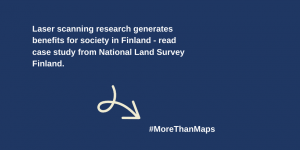National Land Survey Finland
“Autonomous vehicles often include a large number of on-board sensors to observe the dynamic environment all around the vehicle. When practically all vehicles will be equipped with high-quality mapping sensors in the future, remarkable amounts of data could be acquired from urban, traffic and road environments on a continuous basis. If these big data can be exploited beyond the real-time processes of each car, completely new possibilities will open up in the field of dynamic modelling of the 3D road and traffic environment.”
Arvo Kokkonen, Director General, National Land Survey of Finland
National Land Survey (NLS) Finland has developed its own autonomous car within the Academy of Finland-funded Centre of Excellence of Laser Scanning Research (led by Prof. Juha Hyyppä) and started to research autonomous big data as a possible way to provide road environment data for mapping in the future.
NLS Finland built a research platform for autonomous driving, named ARVO (Autonomous Research Vehicle Observatory). ARVO is a Ford Mondeo Hybrid equipped with DataSpeed ADAS Kit allowing the car to be controlled by signals programmed from Robotics Operating System ROS.
The car is already equipped with perception sensors, such as Velodyne VLP-128 lidar, located in the centre of the roof. Four other laser scanners, radars, sonars, GNSS-IMU navigation system and various cameras are located at the windscreen. The concept architecture for ARVO is that it can process/store all data inside the car in two ways: using post-processing scenarios and using near-real-time scenarios.
Autonomous driving will influence societies and human life globally, altering the ways of working and living, and thus presents open questions for us all to solve.
Benefits
- Autonomous fleets will be able to carry out about 75% of the tasks related to mapping in the 2030s, increasing the resource efficiency of mapping, keeping data updated and influencing resource-wise decision-making.
- Increases the frequency of national geospatial information updates, which has an impact on enhancing decision making with real-time information gathered from the road.
- Fosters knowledge-based growth in Finland with demos for the Finnish industry using the data, and models acquired for various civil engineering applications.
- Data acquisition via autonomous vehicles significantly lowers the costs of applying 3D mapping in the smaller communities that typically have been outside the scope of 3D city modeling.
- The project allows Finland to improve the national awareness, knowledge and adaptation in this area.

